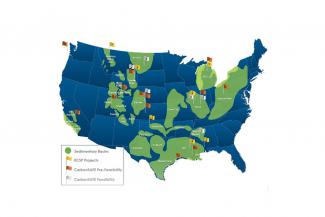Through decades of advanced research, the U.S. Department of Energy’s (DOE) Carbon Storage Program, implemented by NETL, has steadily helped move carbon capture, utilization and storage (CCUS) toward commercialization. In-house carbon storage research in technology areas like wellbore integrity and mitigation; storage complex efficiency and security; and monitoring, verification, accounting and assessment have built a strong science-based foundation for CCUS. These lab- and pilot-scale efforts have advanced technologies to the point where individual companies, utilities and other business entities can design, manufacture and build the equipment and instrumentation needed to implement or commercialize the process. Furthermore, NETL-developed risk and integration tools like the National Risk Assessment Partnership (NRAP), the Energy Data Exchange (EDX), and the CO2 Storage Prospective Resource Estimation Excel Analysis (CO2-SCREEN) tool further support CCUS efforts around the globe.
Through successful collaboration across industry and academia, millions of metric tons of CO2 have been successfully stored since the program began in 1997, and now researchers are turning their attention toward larger geologic storage sites of 50 or more million metric tons (50+ MMT).
To this end, the Carbon Storage Assurance Facility Enterprise (CarbonSAFE) initiative was formed to provide a better understanding of integrated storage project screening; site selection; characterization; baseline monitoring, verification and accounting procedures; and information necessary to submit appropriate permit applications for such projects. Successful completion of the initiative will contribute to the reliable, efficient, affordable and environmentally sound use of fossil fuels by safely and permanently storing CO2 from industrial sources rather than releasing it into the atmosphere.
CarbonSAFE will build off of the groundwork laid by DOE’s Regional Carbon Sequestration Partnership (RCSP) initiative. The RCSPs have successfully characterized and validated the carbon storage potential of seven different regions that vary in geology, CO2 sources, climate, population density and infrastructure. NETL researchers compiled the information into the National Carbon Sequestration Database and Geographic Information System, which was the basis for a series of acclaimed regional and national carbon storage atlases. A series of best practices manuals was published, intended to disseminate knowledge gained through the RCSP field projects and to establish effective methods, reliable approaches and consistent standards for carrying out successful geologic storage projects.
The RCSPs built a strong foundation for the future of CCUS commercialization, and now CarbonSAFE is expanding upon that knowledge and experience to reduce technical risk, uncertainty and costs of commercial-scale storage projects. Projects supporting the initiative will ensure that carbon storage complexes are ready for integrated CCUS system deployment in the
2025-2030 timeframe.
“Our vision of the CarbonSAFE Initiative is to understand the development of a CCUS storage complex from the feasibility study up until the point of injection,” CarbonSAFE Project Coordinator Mary Sullivan said.
Subject to availability of funding, the CarbonSAFE initiative will consist of four phases:
Phase I: Integrated CCS prefeasibility – an 18-month initiative consisting of the formation of a team, development of a feasibility plan and high-level technical evaluation of the sub-basin and potential CO2 sources. Thirteen projects have been funded. This phase is complete.
Phase II: Storage Complex Feasibility – a 2-year initiative for data collection, geologic analysis, analysis of contractual and regulatory requirements, subsurface modeling, risk assessment, evaluation of monitoring requirements and public outreach. Six projects have been funded. This phase is currently being implemented.
Phase III: Site Characterization and CO2 Capture Assessment – a 3-year initiative to complete detailed site characterization and CO2 capture assessment, as well as obtaining National Environmental Policy Act approvals and underground injection Control (UIC) Class VI permits to begin construction.
Phase IV: Permitting and Construction of Storage Complex – a 2.5-year initiative focused on developing risk and mitigation plans, obtaining UIC Class VI permits to inject and completion of injection and monitoring wells.
“Scaling up CCUS from field- to commercial-scale is a significant undertaking, which the CarbonSAFE effort aims to tackle,” Sullivan said. “Some of the significant challenges that remain in the commercialization of CCUS are focused on nontechnical issues, including the application and obtainment of Class VI permits, long-term liability issues and complex business arrangements.”
Significant success has already been achieved through the CarbonSAFE initiative, and continued efforts will benefit power plants and other industries by ultimately making 50+ MMT carbon storage sites a safe, permanent and affordable option for mitigating carbon emissions. The CarbonSAFE initiative is just one example of how NETL is achieving its mission to discover, integrate and mature technology solutions to enhance the nation’s energy foundation and protect the environment for future generations.
Project-specific data produced by the CarbonSAFE effort are available on the Energy Data Exchange (edx.netl.doe.gov). Issued final reports for each of the CarbonSAFE efforts can be found on the DOE's Office of Scientific and Technical Information site (https://www.osti.gov/).




